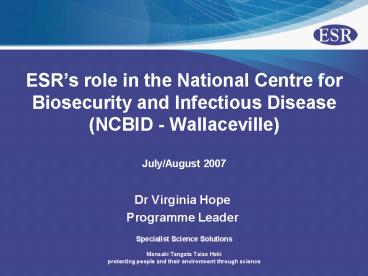ESR - PowerPoint PPT Presentation
1 / 22
Title: ESR
1
ESRs role in the National Centre for Biosecurity
and Infectious Disease (NCBID -
Wallaceville)July/August 2007
- Dr Virginia Hope
- Programme Leader
2
Protecting people and their environment through
science Manaaki tangata taiao hoki
3
- underpinning the
- Public Health and Criminal Justice systems
- in New Zealand
- delivering solutions in
- Environmental Health and
- Forensic Science
4
Major programme areas
- Forensic science
- Communicable disease
- Population environmental health
- Food safety
- Water quality management
- Social science
- Pharmaceuticals
- Drug alcohol free workplace programmes
- Science information management systems
5
Science Centre locations
Mt Albert Science Centre
- Forensic Science
- Analytical Chemistry Lab
- Public Health Lab
Kenepuru Science Centre
- Communicable Disease Labs
- Population Environmental Health
- Pharmaceutical Testing Services
- Forensic Science
National Centre for Biosecurity and Infectious
Disease
- Zoonoses research
- Aberrant event surveillance
- CBRE response
- Laboratory Networks
Christchurch Science Centre
- Food Safety Group
- Analytical Chemistry Lab
- Water Management Group
- Public Health Lab
- Forensic Science
6
Current key initiatives
- DNA Automation for Forensics
- Forensic Research Centre
- Microbial chemical forensics
- National Centre for Biosecurity and Infectious
Disease (NCBID) - Surveillance Information New Zealand (SurvINZ)
- Envirogenomics
7
(No Transcript)
8
NCBID- Wallaceville
- Wallaceville Campus,Hutt Valley
- Collaborative agreement
- Supported by MAF, MoH, MORST
- Approximately 90 scientists and researchers will
be co-located - Co-ordination of effort scientific synergies,
joint investigations, interoperability
9
ESR NCBID
- New PC2 laboratories and office space - 4.9m
- Three laboratories
- Enteric Reference Laboratory
- Virus Identification ReferenceLaboratory (incl.
WHO national reference services) - Arboviral Laboratory
- Leptospira Laboratory
- Room for expansion
- Completion 2007
- Initially 20 microbiologists (bacteriologists,
virologists, molecular biologists),
epidemiologists and disease modellers, and
researchers - Growing to 25-30 short term
10
(No Transcript)
11
ESR Objectives
- Guaranteed long-term access to the only PC3
facility in NZ - Enhanced reference laboratory services
integrated surveillance specialist surge
capacity epidemiological support for outbreak
investigation - Coordination of existing activities for optimal
emergency response e.g. white powder response - Synergies
- Partners
- on site
- research/academic organisations
- national government
- local government and regional offices
- private sector
- internal SurvINZ and Microbial and Chemical
Forensics
12
NCBID
13
Post-graduate training
Skill Development Post docs, tertiary training,
seminars and conferences
Training Workshops
Ecology of Emerging Infectious Diseases
Technology Transfer
Detection Surveillance, disease modelling and
forecasting
Biosecurity and Infectious Disease Response
Laboratories, surveillance, investigation
Research Programme
Microbial and chemical forensics
SurvINZ
National Centre for Biosecurity and Infectious
Disease Wallaceville
14
NCBID and Laboratory Response
- Characteristics of National Centre response
- Supporting all of Government and throughout NZ
- Highest biocontainment culture collection
supplementary confirmation/identification
detection of GE agents and toxins links for
response (GOARN/ WHO/ PulseNet Asia-Pacific and
PulseNet International) - Rapid co-ordinated response lab/lab
network/surveillance system - Capability to develop or assess, validate, and
apply novel methods as required
horizon-scanning - Robust QA and HS environment
- Specialist expertise and surge capacity
15
NCBID and Research
- Avian influenza (ESR, IDC, AgR, WSM)
- Understand the ecology of avian influenza
viruses (AIV) and potential AIV transmission
pathways - CDRP Vector-borne disease (MAF, ESR, NZ
Biosecure, Landcare) - Investigating the threat of vector-borne disease
in New Zealand - Salmonella (ESR, AgR)
- Investigating genetic differences
- REANNZ/KAREN
- Microbiology laboratory networks and
international data sharing - Rickettsial disease (ESR, Landcare)
- Epidemiological and ecological research
16
NCBID and Research
- MICROBIAL AND CHEMICAL FORENSICS
- 4 year ESR developmental research programme
- Biological agents
- Food and water safety threats (e.g. norovirus,
shigella) - Biological warfare agents (e.g. anthrax,
botulism) - Important Australian Arboviral Diseases (e.g.
RRVd, BFV) - Chemical agents
- Chemical warfare agents (e.g. sarin, sulphur
mustard, ricin) - Pesticides (e.g. 1080, cyanide)
- Toxic industrial chemicals (e.g. chlorine and
phosgene) - Clan Lab chemicals (e.g. phosphine, ammonia)
- Explosives
17
NCBID and Research
- MCF plans for the next 2 years
- Development and implementation of rapid screening
and confirmatory analysis methods for the
priority risk agents - Extraction of risk agents from environmental
sources - Collection and analysis of gas/vapour samples
- Obtaining forensic evidence to help link a
suspect with a crime in which a priority risk
agent was involved - Analysis of clinical samples to confirm whether
individuals have been exposed to a risk agent
18
Information and action to support response
- Reports for monitoring and action
- Weekly collation and analysis of EARS reports
- Monitoring, collation, and reporting of overseas
surveillance and alert information - International links
- Enternet/ European Centre
- PulseNet Asia-Pacific/ International
- GOARN
- Sister agencies
- Incident investigation and response
19
In summary ESR NCBID will provide
- Core national reference laboratory testing up to
PC3 containment level - Capability development in laboratory testing for
potential infectious and chemical threats - Analysis and information for action for
responders to infectious diseases and other
threats - Training and development in core areas of work
- Capability for coordination and networking for
- laboratory diagnostics and research
- public health unit investigations
- Investigations of other threats to health
20
Can this or other support help you
- To better safeguard New Zealanders health and
economy from infectious diseases and other
emerging threats? - Timely information on infectious diseases/ other
aberrant events in New Zealand and overseas - epidemiology
- modelling
- alerts
- PulseNet and other information
- links with biosecurity
- Risk assessment
- Microbiological research network and research
collaboration - Capability in scientific support
21
(No Transcript)
22
Virginia.Hope_at_esr.cri.nz
- 04 9175907
- 0276535681
www.ncbid.govt.nz































